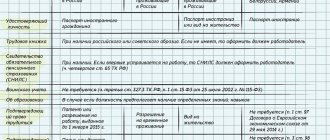15.07.2019
0
1059
5 minutes.
The Labor Code of the Russian Federation establishes clear conditions for interaction between managers and subordinates, on the basis of which both parties have the opportunity to protect their rights, including through the judiciary. But in order for the Labor Code of the Russian Federation to come into force, the employee must have official employment confirming his connection with a specific enterprise and its superiors. We will find out how it is formalized and what responsibility it places on the citizen in the article below.
Registration for work
Labor relations in the Russian Federation are regulated and regulated by the Labor Code of the Russian Federation. It describes all the features and nuances of the relationship between the boss and subordinates.
It is mandatory for a citizen to have a work book. It contains data on official employment and dismissals. The document is extremely important when assigning a pension.
But more and more often in practice we find work under a contract without a work book. What advantages and disadvantages does this scenario have?
The need for a probationary period
In accordance with Article 70 of the Labor Code of the Russian Federation, the employer may set a certain period of time during which he will test the skills of his new employee. This period is characterized by a shortened schedule, a reduced daily rate and a lack of protection for the subordinate from the trade union committee. But otherwise, the same rules apply to interns as for ordinary employees.
In this case, the condition in the form of a probationary period must be specified in the employment contract. Among the persons to whom the internship does not apply are:
- Subordinates who were hired by the enterprise based on the results of a competitive selection;
- Pregnant;
- Minors;
- Citizens with secondary technical or higher education in the specialty for which they are applying;
- Seasonal workers employed for 1-2 months.
For the remaining categories of employees, the probationary period is established on an individual basis. But according to the requirements of the Labor Code of the Russian Federation, it cannot exceed:
- 90 days – for an ordinary worker;
- 6 months – for citizens holding leadership positions or related to government agencies;
- 14 days – for persons who have entered into a seasonal contract.
Based on this, it turns out that an internship for official employment is not necessary, or at least not mandatory.
Legality
The first thing you should pay attention to is the legality of this work. Is it possible to work without a work book, and even officially?
According to established legislation, it is impossible to work with a contract without a work permit. The corresponding entries must be made in the employee’s document.
The agreement may be oral, but such experiments are not encouraged. Indeed, in this case, employment will be considered unofficial. And this, in turn, is illegal. Registration for work under an employment contract takes place in Russia. But without an entry in the work book, the work is considered risky.
What risks does an employee take when applying for employment under a GPC agreement?
From a legal point of view, a civil law contract is a completely acceptable alternative to a regular employment agreement. In certain situations, a contract or agency agreement may be more beneficial for the employee:
- a civil contract does not oblige the employee to visit the office every day - the assigned amount of work is carried out at any time convenient for the person;
- the performer does not have a direct supervisor, he acts on his own behalf and is responsible only to himself;
- The contractor is not tied to a specific company; if he has the potential, he can cooperate with several organizations, which will significantly increase his remuneration.
At the same time, a citizen working under a civil law contract is not protected from the whims of the customer by the provisions of labor legislation. The negative consequences of civil legal contracts are as follows:
- the performer does not have the right to any type of leave (annual, educational, maternity leave);
- in case of illness, time spent on treatment is not paid;
- an employee registered under a GPC agreement has a “gap” in his work experience;
- the remuneration received by the contractor under a civil contract is not subsequently taken into account when calculating average earnings (to pay for vacations or social benefits);
- if the assigned task is completed in violation of the deadline, the customer has the right to apply penalties to the contractor;
- The customer may, on his own initiative, terminate the contract at any time before its expiration. In the best case scenario, the contractor will receive only part of the amount due to him, in the worst case, he will be left without remuneration.
Applying for a job without a work book is possible. Ultimately, the guarantee of compliance with legal relations between an employee and an employer is not an entry in the work book, but a correctly completed contract. If an employee has a choice, then it makes sense to give preference to a standard employment contract. In situations where the employer insists on employment under a GPC agreement, you should protect yourself as much as possible by carefully studying the terms of the contract.
Exceptions to the rules
However, some exceptions still occur. Working under a contract without a work book is possible under certain circumstances. Moreover, as practice shows, it is absolutely legal.
Among the main opportunities that allow the population to work without labor are:
- primary employment of a citizen;
- part-time work;
- labor under a civil contract;
- work with a lost or damaged work book (while the document is being restored).
In all these cases, the agreement between the parties is signed without a labor agreement. Such work has its advantages and disadvantages. Which ones specifically? What should every citizen consider?
Distant work
Anyone can work remotely. This is an excellent option for modern communication via the Internet. The contractor and the customer may be separated by several kilometers, cities or even countries. For example, a lawyer advises clients online, an accountant sends reports, a teacher teaches courses. This is possible from anywhere in the world, from any convenient location. An important condition for smooth operation is Internet access. The customer has the right not to pay personal income tax if the contractor is located in the territory of another state.
A full-time employee of the company also has the opportunity to work remotely. In this case, an agreement on remote work is concluded (Article 312.1 - 312.5 of the Labor Code of the Russian Federation).
Draw up a GPC agreement or employment relationship for a freelancer? The issue is resolved by agreement of the parties. Conclusion and registration occurs exactly the same as offline. In practice, the customer prefers not to enter into a contract at all. Be careful, never poison the originals of your documents.
Civil contract
Civil contracts are becoming more and more common in practice. For retirement, such a relationship between employer and subordinate is no different from working with a work book. After all, the boss will still have to make contributions to the Russian Pension Fund. But regarding labor guarantees there are some peculiarities.
Working under a service contract, as well as other legal agreements, does not provide any significant labor guarantees. For example, you can forget about paid sick leave, vacation and bonuses. This fact is considered a disadvantage.
The employer:
- issues SNILS if necessary;
- makes contributions to the Pension Fund and the Federal Compulsory Medical Insurance Fund;
- offers citizens insurance against accidents at work.
These are the advantages of a civil law contract. Under certain circumstances, such an agreement may be recognized as an employment agreement.
How can you formalize your relationship with an employee?
Labor relations are only those relations between employer and employee that have the characteristics specified in Article 15 of the Labor Code of the Russian Federation :
- work according to the position in accordance with the staffing table, profession, specialty indicating qualifications;
- the specific type of work assigned to the employee (labor function);
- subordination of the employee to internal labor regulations;
- provision by the employer of working conditions provided for by labor legislation and other regulatory legal acts containing labor law norms.
But in addition to labor relations based on an employment contract, interaction with an employee can also be formalized within the framework of civil law relations, when the employer and employee act as a customer and performer. Such relationships are not subject to labor laws and relieve the customer of a significant share of responsibility for the working conditions of the contractor. At the same time, Article 15 of the Labor Code of the Russian Federation emphasizes that the conclusion of civil contracts that actually regulate labor relations between an employee and an employer is not allowed.
The most frequent complaints from regulatory authorities are precisely the attempt to present real labor relations under the guise of civil law. What does the employer gain in this case? He not only has the opportunity not to pay insurance premiums for injuries and occupational diseases for the employee to the Social Insurance Fund, but also does not have to provide vacation, sick leave, maternity payments and dismissal benefits. But if the employer wins here, then the employee loses, therefore, from January 1, 2014, he has the right to demand that civil law relations be recognized as labor relations (Article 19.1 of the Labor Code of the Russian Federation), if there are real grounds for this.
We propose to take a closer look at how the interaction between employer and employee is structured within the framework of labor relations itself and within the framework of civil law, among which there is also the option of agency labor (staff leasing).
Provision of services
Work under a contract or service contract is becoming more and more common. Typically, such an agreement indicates that someone provides a service and someone pays for it.
Typically, the employer will be the customer. The text of the document specifies all the conditions for the provision of the service, as well as the consequences that will occur if the agreement is violated.
The main advantage is high profits. Disadvantages include the difficulty of legalizing funds received and the need to pay taxes on your own.
Basic provisions according to the Labor Code of the Russian Federation
The contract helps determine the rights and obligations of the parties, the employer and the hired personnel. On its basis, the employee has the right to demand payment of wages in the established amount and terms, and the company has the right to make demands on employees to perform a certain set of actions in accordance with the schedule and degree of workload. A contract with a company guarantees that a person will comply with the essential terms and conditions of employment that the employer promised during the interview.
The drafting rules require strict compliance with the provisions of Article 57 of the labor legislation. Failure to comply with the provisions specified in Art. 57 of the Labor Code of the Russian Federation, mandatory conditions threaten to recognize the document as legally untenable.
To ensure compliance with the law, you need to know what should be in an employment contract.
The structure of the document involves the inclusion of mandatory conditions, provisions that do not contradict labor legislation and clauses confirming the internal rules and regulations in force at the enterprise.
Proof of Work
Working under a contract without a work book has one significant drawback - it is the need to prove work activity at a given period of time in the Pension Fund. Otherwise, work without labor will not be counted toward the length of service for calculating your pension.
As practice shows, it is the work record that is the main indicator when assessing the duration of a citizen’s work throughout his life. But if necessary, you can additionally submit other documents.
Which ones exactly? These include:
- contracts (including civil law);
- certificate of work performed under the contract (a very common case);
- pay books and receipts;
- witness testimony (minimum 2 people);
- union cards.
All of the listed papers will help prove work activity, but only when the employer or the subordinate himself makes appropriate contributions to the Pension Fund.
pros
What are the advantages of working under a contract? The deadlines for completing certain tasks, providing services or labor are specified in the agreement. The citizen will know exactly how much and how exactly he will have to perform certain tasks.
Further, it is customary to highlight high wages as the main advantage. It is this point that often becomes the main motive for working without a work book. Workers want to receive decent wages, even without taking into account length of service.
This concludes the description of the positive aspects of working without labor. The benefits of such work are called dubious.
Flaws
But the disadvantages of the studied labor relations are much greater. Working under a tenancy agreement without a work book implies, as you might guess, good earnings. At the same time, it will be necessary to take into account that no social or labor guarantees will be provided to the employee. As was said, you can’t count on sick leave, vacation and, as a rule, bonuses.
The next disadvantage is the employer’s dishonesty. There are very few good and honest bosses (customers). If a citizen does not work according to a work book, he is vulnerable. Proving the existence of a contract can be difficult. And a dishonest boss can simply deceive an employee.
It is very common for people to simply not get paid. The work is completed, but the boss does not provide the required funds. You have to go to court and prove the fact of employment. Or accept the fact that work under a contract or any other agreement will not be paid.
Another disadvantage is the lack of work experience. As has already been emphasized, the Pension Fund will have to prove the conduct of a particular work activity without a work book. This process causes a lot of trouble.
Also, when working under an employment contract, the agreement is signed for a specific period. After its onset, a person may be left without work - he will either have to renew the contract or look for a new employer.
In fact, the citizen does not receive any guarantees. But they are partially compensated by high wages. Therefore, some people agree to work without a work book. This practice is appearing in Russia more and more often.
Types of employment contracts
The first way documents may differ is their validity period. There are fixed-term and open-ended contracts.
Fixed-term employment agreements
— documents that have a certain validity period (no more than 5 years).
Indefinite employment contracts
- agreements concluded for an indefinite period.
Fixed-term employment contracts can become permanent. This is possible if the employee, after the expiration of the agreement, remains to work at the enterprise on the basis of internal orders and transfers. And there is no need to conclude a new employment contract with the employee.
Open-ended employment agreements can become fixed-term based on the points specified in Art. 59 Labor Code of the Russian Federation. To switch from a permanent contract to a fixed-term contract, you need to terminate the previous agreement and enter into a new one.
Types of employment contracts by the nature of the working relationship
:
- By main place of employment. This is the case when an employee is hired to perform certain duties specified in the contract.
- At the same time. These employment contracts are concluded in cases where, in addition to his duties, the employee must perform additional duties. For example, an economist may perform the duties of an accountant when he is on vacation.
- To perform seasonal work. As a rule, such agreements are concluded for a period of 3 months. It all depends on the type of seasonal work.
- To perform temporary work. For example, it is required to carry out work whose completion period is less than 2 months.
A separate category includes employment contracts concluded with government employees. For example, with the military, government employees.
There is also a division of labor agreements depending on working conditions
. An employee can work under normal conditions at an enterprise, on night shifts, in hazardous industries and in the Far North. All terms and conditions of employment must be specified in the employment contract.
There is a contract - no labor contract
Working as a driver under a contract without a work book is a risky business, just like in most other cases. In Russia, employers who do not issue a work book or do not make appropriate employment records in the document of a subordinate are punished. Therefore, we can say that such a situation is a jurisdictional matter.
If, after employment, a citizen is not given a work book or is not accepted for making records of work activities, you can safely complain to the labor inspectorate.
What to do if a person chooses a part-time job? How to work part-time? According to the law, you can do without additional paperwork and registration of a work book. But in practice, subordinates usually ask to include information about their part-time work in the document. After all, this is a guarantee of a high pension.
Rules for drawing up an employment contract
When concluding an agreement with an employee for a certain period, the document must indicate for which period. It is also necessary to state the grounds for concluding such an agreement. For example, you need to carry out pipe welding work at a construction site. The period for completing such work will be 2 years. The contract specifies this validity period, as well as the employee’s responsibilities.
In a permanent agreement, other parameters must be specified. The rules for its preparation are specified in the Labor Code of the Russian Federation.
| " Example (sample) of an employment contract concluded between a legal entity and an individual in 2021 " The download will begin immediately after clicking on the Word icon |
What should an employment contract contain?
The document contains the following information:
- Full name of the employee;
- name of the enterprise or individual - employers;
- information about identification documents of the employee and employer (passport, TIN, state registration certificates);
- place and date of conclusion of the employment agreement.
If the document is signed by an authorized person and not the head of the enterprise, you must indicate on the basis of which document he is acting.
The main part of the employment contract must contain the following information:
- Place of work. This may be a central office or a branch indicating the location.
- Labor function. This paragraph indicates what position the employee will work in in accordance with the staffing table of the enterprise. Specific job responsibilities are also indicated.
- Start date of work. As a rule, the employee begins to perform his work duties on the day the employment agreement is signed. But it may also be that the contract is signed, for example, on the 12th, and the employee starts work on the 15th. These nuances are recorded in the document.
- Salary. The agreement specifies the amount of salary, allowance, bonus and other payments to the employee. If this information is not indicated, references are made to other regulatory documents of the enterprise, which say who receives how much.
- Work and rest schedule. According to Art. 91 of the Labor Code of the Russian Federation, the working week lasts 40 hours. If the employee is 16 years old, his working week cannot exceed 24 hours. Disabled people of groups I and II work no more than 35 hours a week. Working hours are distributed depending on the employee’s responsibilities.
- Nature of the work. For example, in the office, traveling, and so on.
- Working conditions. These can be hazardous or non-hazardous industries.
- Guarantees of payment of compensation provided that the employee works in hazardous work.
- Compulsory social insurance for employees. The contract indicates that the employee has the right to insurance in accordance with established legislation.
As additional information, the employee’s obligations are prescribed not to disclose trade secrets or registration of insurance under a VHI policy.
It is worth considering that additional information in the employment contract cannot worsen the employee’s position.
All this information is divided into several points: basic provisions, employer responsibilities, employee responsibilities. Violation of the terms of the employment agreement by one of the parties may entail administrative liability.









